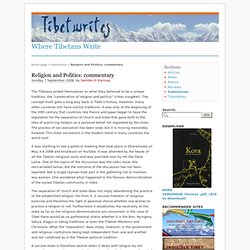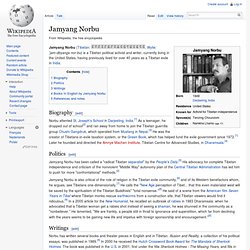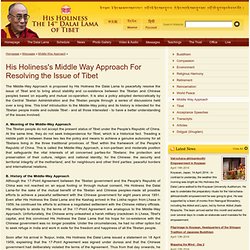

Tibet Travel Guide and Travel Information. Welcome to Dungse Garab Rinpoche's Dudjom Dharma World. Religion and Politics: commentary - Where Tibetans Write. The Tibetans prided themselves on what they believed to be a unique tradition, the "combination of religion and politics" (chosi zungdrel).

The concept itself goes a long way back in Tibet’s history. However, many other countries still have similar traditions. It was only at the beginning of the 20th century that countries like France and Japan began to have the legislation for the separation of church and state that gave birth to the idea of practicing religion as a personal belief not regulated by the state. The process of secularization has been slow, but it is moving inexorably forward. This state secularism is the modern trend in many countries the world over.
It was startling to see a political meeting that took place in Dharamsala on May 3-4 2008 and broadcast on YouTube. Phagpa’s Arrow, or Buddhists vs Daoists. I think it might be fair to say that Tibetan Buddhism hasn’t often come into direct conflict with other religions. And although I’m all for the harmonious coexistence of religions, I find the few instances of head-on confrontation quite interesting. So let’s look at what happened once when Buddhism and Daoism came to blows. It was in the cosmopolitan court of Kubilai Khan, during the height of Mongol power. There was a new, vigorous school of Daoists, called Quanzhen. The school had been founded in the eleventh century, and by the twelfth it already had 4,000 monasteries and 20,000 priests. During the 1250s, Quanzhen monks were roaming around China taking over small Buddhist monasteries and converting them to Daoist ones.
These were opening skirmishes. Kubilai’s imperial preceptor at this time was Chögyal Phagpa, the head of the Sakya school, and by the Khan’s command, ruler of Tibet. Erotic Poetry by the Sixth Dalai Lama. Tibetan Rock. Tsampa - New York Restaurant - MenuPages Tibetan Restaurant Search. Jamyang Norbu. Jamyang Norbu (Tibetan: འཇམ་དབྱངས་ནོར་བུ་, Wylie: 'jam-dbyangs nor-bu) is a Tibetan political activist and writer, currently living in the United States, having previously lived for over 40 years as a Tibetan exile in India.

Biography[edit] Politics[edit] Jamyang Norbu has been called a "radical Tibetan separatist" by the People's Daily.[5] His advocacy for complete Tibetan independence and criticism of the nonviolent "Middle Way" autonomy plan of the Central Tibetan Administration has led him to push for more "confrontational" methods.[2] Jamyang Norbu is also critical of the role of religion in the Tibetan exile community,[6] and of its Western benefactors whom, he argues, see Tibetans one-dimensionally.[7] He calls the "New Age perception of Tibet... that this even materialist west will be saved by the spiritualism of the Tibetan Buddhists" "total nonsense.
Writings[edit] Books In English by Jamyang Norbu[edit] References and notes[edit] His Holiness's Middle Way Approach For Resolving the Issue of Tibet. The Middle-Way Approach is proposed by His Holiness the Dalai Lama to peacefully resolve the issue of Tibet and to bring about stability and co-existence between the Tibetan and Chinese peoples based on equality and mutual co-operation.

Tibet:Two Distinct Views. The Monthly magazine on all aspects of Tibet - Tibetan Review. Converting Between Buddhist and Gregorian Calendar Systems. There are a number of date systems used around the world.

The most-widely used is called the Gregorian calendar, with the BC and AD date system familiar to many people. There is another calendar system used by many people around the world called the Buddhist calendar. This calendar system begins its reckoning based on the birth of Buddha. Since this religious leader was born in 543 BC (or Jesus was born 543 years after Buddha, depending on how you look at it), you can convert from one system to another simply by making the proper adjustment to the year. Helena Norberg-Hodge - Ladakh. For more than a decade, Helena Norberg-Hodge has been helping Ladakh, an isolated Himalayan culture, to preserve its strengths and choose carefully from the West as it modernizes.

In 1986 the Ladakh Ecological Development Group (of which she is the director) was awarded the Right Livelihood Award (also known as "the alternative Nobel Prize") in recognition of their remarkable work. For more information about, or to contribute to, this important project, write to The Ladakh Project, Open Space Institute, 122E. 42nd St. Rm. 1901, N.Y., NY 10168. - Robert Gilman Robert: Helena, what is the story of Ladakh? Helena: I think Ladakh was one of the last cultures on the earth to come in contact with Western culture. I had previously been in touch with a very remote tribe in a place called San Cristobal de las Cartas in Chiapas. So it was quite an experience to come in touch with the Ladakhis in 1975. Robert: How did you get involved? Tibet House US. Amazon. Amazon. Amazon. Lonely Planet Bhutan (Country Travel Guide) (9781741049190): Bradley Mayhew.
Amazon. Amazon. Amazon.